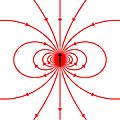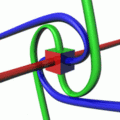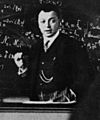Spin (physics) facts for kids
In physics, spin is a way to describe how objects, even tiny ones, seem to rotate. For big things we can see, like our Earth, spin is simply how much it turns around its center axis. It tells us how much rotation an object has. The amount of spin changes based on how heavy an object is, its shape, and how quickly it's turning.
Contents
Understanding Spin in Tiny Particles
What Experiments Showed About Spin
Scientists did experiments, like the famous Stern-Gerlach experiment. These experiments showed that very tiny particles, called sub-atomic particles, act like tiny magnets. For example, electrons seem to have a north pole and a south pole.
At first, scientists thought this meant these particles were actually spinning. They imagined them spinning on their own axis, just like a planet spins.
Why Particles Don't Spin Like Planets
Later, scientists realized there was a problem with this idea. For an electron to spin fast enough to create the magnetic effect they saw, it would have to spin faster than the speed of light. This is impossible according to the laws of physics.
So, scientists no longer believe that electrons are physically spinning like tiny planets. However, they still use the word "spin" to describe these special magnetic properties of particles. It's a bit like a nickname that stuck!
Spin's Special Rules
Even though particles don't physically spin, their "spin" still follows some rules of regular rotation. But it also has its own unique rules. For example, a "spinning" electron can only have specific amounts of spin. It can't have just any amount.
Also, electrons can line up in a magnetic field in ways that seem strange to us. These ways are different from how a regular magnet would behave in our everyday world. Spin is considered a basic and important property of every particle.
Related Topics
Images for kids
-
Wolfgang Pauli giving a lecture.
See also
 In Spanish: Espín para niños
In Spanish: Espín para niños




